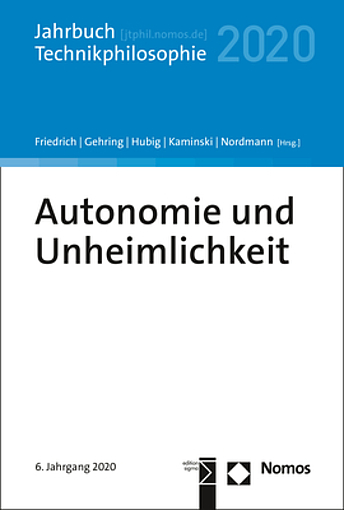englischIs technological control taking the place of what appeared uncannily uncontrollable? Or is it itself becoming uncanny? Two seemingly contradictory narratives have shaped the history and theory of technology. The narrative of disenchantment describes how nature, experienced as something foreign and dangerous, was tamed by becoming scientific and mechanised. Secondly, the narrative of (re-)enchantment recounts how artefacts and technological possibilities become uncanny, especially by way of their seeming independence and by confronting us with an ‘autonomous’ logic of their own. In today's debates about self-learning, ubiquitous, invisible and opaque technologies, the uncanny moment resonates of a technology with ‘a life of its own’. Following up on the mechanisation and automation discourses of the 20th century, this contributes to the ‘demonisation’ of technology.
On the one hand, technology makes the world familiar and comprehensible, e.g. by equating understanding with technical reconstruction. On the other hand, the technical reproduction of the world – or its radical transformation into an alienated one – is experienced as something disturbing. When artefacts appear to do ‘what they want’ or when large technical systems shape the world according to their ‘own logic’, a limit is reached that was already mentioned by Freud – we become uncertain whether we are still living in the modern world at all.
Dieser Titel ist Teil der Reihe JAHRBUCH TECHNIKPHILOSOPHIE mit der ISSN 2297-2072 für die print-Ausgaben und der ISSN 2297-2080 für die eBooks.
Überwindet Technik das unheimlich Unbeherrschbare? Oder wird sie uns selbst unheimlich? Zwei scheinbar widersprüchliche Narrative prägen die Geschichte und auch die Theorie der Technik: Das Narrativ der Entzauberung beschreibt, wie eine als fremd und gefährlich erfahrene Natur durch Verwissenschaftlichung und Technisierung gezähmt wurde. Das Narrativ der (Wieder)Verzauberung schildert, wie uns Artefakte und technologische Möglichkeiten unheimlich werden, insbesondere wenn sie sich zu verselbständigen scheinen oder mit „autonomem“ Eigensinn gegenübertreten. In den heutigen Debatten um selbstlernende, ubiquitär verteilte, im Assistenzmodus unsichtbare, dabei opake Techniken schwingt das unheimliche Moment einer „Verselbständigung“ von Technik mit – und trägt im Anschluss an die Mechanisierungs- und Automatisierungsdiskurse des 20. Jahrhunderts zur „Dämonisierung“ der Technik bei.
Technik macht Welt einerseits vertraut und nachvollziehbar: Paradigmatisch wird dies in der Idee, dass etwas dann verstanden wird, wenn es technisch rekonstruiert werden kann. Andererseits wird die technische Reproduktion von Welt – oder deren radikale Umgestaltung zu einer entfremdeten – als etwas Verstörendes erlebt. Spätestens, wenn Artefakte zu tun scheinen, „was sie wollen“ oder technische Großsysteme die Lebenswelt nach ihren „Eigenlogiken“ prägen, ist eine schon von Freud benannte Grenze erreicht, an der wir verunsichert werden, ob wir überhaupt noch in der modernen Welt leben.
- Dr. Alexander Friedrich
- Prof. Dr. Petra Gehring
- Prof. Dr. phil. Christoph Hubig
- Prof. Dr. Andreas Kaminski
- Prof. Dr. Alfred Nordmann



